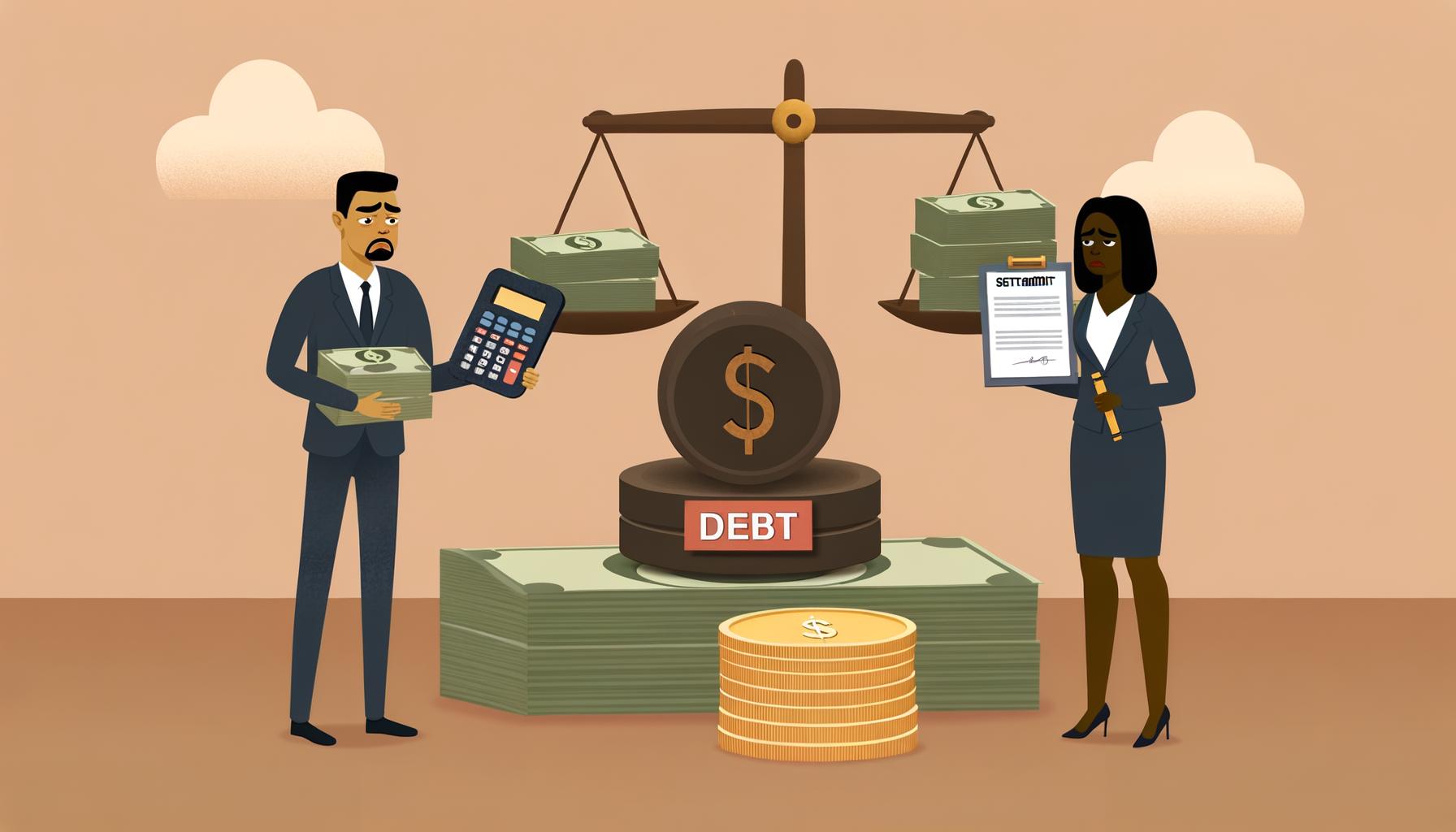For many Anaheim residents grappling with financial instability, debt settlement emerges as a practical and effective solution. Debt settlement involves negotiating with creditors to reduce the total amount owed, making it easier for individuals to pay off their debts.
This strategy is particularly beneficial for those struggling to manage multiple high-interest debts or facing the possibility of bankruptcy. Engaging in debt settlement can significantly ease your financial burden, allowing you to regain control over your finances and work towards long-term stability.
Debt management is crucial when aiming for financial health, particularly in a bustling city like Anaheim, where living expenses can quickly accumulate. Properly handling your debts can prevent the negative impacts of overwhelming financial stress, such as damaged credit scores or legal consequences. Implementing a successful debt settlement plan not only helps in clearing existing debts but also sets the foundation for better financial practices moving forward.
Understanding how debt settlement works is the first step toward making informed decisions about managing your finances. Residents of Anaheim have access to various resources and strategies tailored to their needs, which we’ll explore throughout this article. Whether you’re just beginning to feel the strain of mounting bills or already finding it difficult to keep up with payments, navigating debt settlement wisely could be the key to reclaiming your financial freedom.
Assessing Your Financial Situation
Before embarking on the journey of debt settlement, it’s crucial to gain a clear understanding of your financial situation. Start by organizing all relevant documents, including credit card statements, loan agreements, and any other unpaid bills. List your debts comprehensively and categorize them based on interest rates and repayment terms. This will give you an overview of what you owe and make it easier to prioritize which debts to address first through debt settlement.
Next, create a detailed budget that outlines your monthly income and expenses. Use tools such as budgeting apps or spreadsheets to track your spending habits accurately. By identifying areas where you can cut back or make adjustments, you’ll be in a better position to allocate funds toward settling your debts. Knowing exactly where every dollar goes can help in making informed decisions about how much you can realistically offer creditors when negotiating settlements.
Additionally, utilizing local resources in Anaheim for financial assessment can be advantageous. Many nonprofit organizations provide free financial counseling services that can help you evaluate your situation thoroughly. These professionals can guide you through the process of assessing income versus liabilities and may offer personalized advice tailored to Anaheim residents’ specific economic landscape. A well-rounded understanding of your finances is essential before diving into any debt settlement plan, ensuring that you’re prepared for the commitments ahead.
Exploring Debt Settlement Options
Lump-Sum Payment
One of the most straightforward debt settlement strategies is making a lump-sum payment to your creditor. This approach involves negotiating with your creditor to accept a significant, one-time payment that is less than the full amount you owe. The advantage of this strategy is that it can quickly reduce or eliminate your debt, allowing for immediate financial relief.
However, gathering the necessary funds for a lump-sum payment can be challenging and may require tapping into savings or liquidating assets. It’s also important to ensure that any agreement reached is documented in writing to protect yourself from future claims.
Installment Plans
If a lump-sum payment is not feasible, consider negotiating an installment plan with your creditors. This option allows you to repay the settled amount over time through manageable monthly payments. Installment plans offer more flexibility and make debt settlement accessible even if you don’t have a large sum of money on hand.
While this process may take longer to complete, it provides structure and helps maintain discipline in managing repayments. Be sure to clarify all terms and conditions with your creditor before agreeing to an installment plan, as missing payments could void the settlement agreement and worsen your financial situation.
Third-Party Negotiation
For those who feel uncomfortable negotiating directly with creditors or lack the confidence to do so effectively, hiring a reputable third-party debt settlement company can be beneficial. These companies specialize in negotiating settlements on behalf of clients like Anaheim residents and can often secure better terms due to their expertise and established relationships with creditors.
However, it’s crucial to choose such companies carefully; look for organizations accredited by trade bodies such as the American Fair Credit Council (AFCC) and scrutinize their fees upfront. Engaging in third-party negotiation also entails understanding potential impacts on your credit score and evaluating whether this approach aligns with your long-term financial goals.
In summary, exploring various debt settlement options-whether through lump-sum payments, installment plans, or using professional negotiators-enables Anaheim residents to find tailored solutions that best fit their unique financial situations while paving the way toward greater economic stability.
Finding a Reputable Debt Settlement Company in Anaheim
When searching for a reputable debt settlement company in Anaheim, there are several criteria to keep in mind to ensure you choose a trustworthy partner. First and foremost, verify the company’s accreditation and certifications. Reputable companies are often associated with organizations like the American Fair Credit Council (AFCC) or the International Association of Professional Debt Arbitrators (IAPDA). These certifications can serve as an assurance that the company adheres to industry standards and codes of conduct.
Another important factor is transparency in fee structures and services provided. Legitimate debt settlement companies should clearly outline their fees and how they structure payment plans without hidden charges. Be cautious of companies that ask for substantial upfront fees before any settlements have been made; legitimate companies typically charge only after successfully negotiating a debt settlement on your behalf.

It’s also crucial to look at customer reviews and testimonials. Trusted platforms like the Better Business Bureau (BBB) or Yelp can provide insights into past clients’ experiences with various debt settlement companies in Anaheim. Pay particular attention to reviews that mention timely communication, successful settlements, and customer service quality. Equally important, watch out for red flags such as unresolved complaints or negative feedback regarding fraudulent activities.
Local resources can also be invaluable when selecting a reliable debt settlement service in Anaheim. City-specific consumer protection agencies may offer guidance on reputable firms operating within Anaheim. Additionally, financial counseling services available through local non-profits or community centers can provide recommendations based on firsthand knowledge of the area’s financial landscape.
In summary:
- Accreditation: Look for AFCC or IAPDA certified companies.
- Transparency: Ensure clear disclosure of fees and avoid those asking for large upfront payments.
- Customer Reviews: Check BBB ratings, Yelp reviews, and other testimonials.
DIY Debt Settlement
When considering debt settlement, taking a DIY approach and negotiating directly with creditors can often be an empowering path. This method allows you to take control of your financial situation without relying on external agencies, which could potentially save you additional fees. To start, you need to develop a clear strategy and understand the terms you’re willing to accept. Begin by gathering all relevant information about your debts, including amounts owed, interests rates, and any other pertinent details.
One effective approach in DIY debt settlement is to propose a lump-sum payment. Creditors are sometimes willing to accept a lesser amount if they receive it all at once because it eliminates the uncertainty of future payments. When proposing a lump-sum payment:
– Start by offering 40-50% of the total debt amount.
– Highlight your current financial difficulties.
– Stress that accepting this offer could ensure immediate partial recovery for the creditor.
If a lump-sum payment isn’t feasible, consider negotiating an installment plan where you can make more manageable payments over a period of time. Be prepared with a realistic budget showing what you can afford each month and use this as leverage during negotiations.
Effective communication is essential when dealing directly with creditors. Here are some common techniques:
1. Politeness: Always maintain a polite tone to keep negotiations amicable.
2. Documentation: Keep records of all communications and agreements in writing.
3. Persistence: If initially met with resistance, continue negotiating; persistence is often key in these discussions.
Avoiding pitfalls is crucial during this process. One major pitfall includes making promises you cannot keep; only agree to terms that fit within your financial capabilities. Also, watch out for overly aggressive tactics from creditors who might pressure you into unfavorable settlements or decisions made out of desperation.
With determination and careful planning, DIY debt settlement can be both manageable and beneficial in achieving greater financial stability while minimizing costs associated with professional services.
Impact of Debt Settlement on Your Credit Score
When considering debt settlement as a viable financial strategy, it is important to understand its impact on your credit score. Debt settlement typically involves negotiating with creditors to pay a lump sum that is less than the total amount owed.
While this can provide immediate relief from overwhelming debt, it often comes with significant ramifications for your credit score. Settling a debt generally results in its status being marked as “settled” or “paid for less than agreed,” which can stay on your credit report for up to seven years and negatively affect your credit history.
Short-Term Effects on Credit Score
One of the immediate impacts of debt settlement is a drop in your credit score. This decline occurs because settling a debt signifies that you were unable to fulfill the original payment terms. For creditors and future lenders, this raises red flags about your ability to manage and repay debts.
The extent of the decrease in your credit score depends on various factors such as your overall credit history and the amount you owe. However, even though it affects your credit score, opting for debt settlement could be beneficial if you’re facing insolvency or considering bankruptcy.
Long-Term Financial Consequences
While the short-term effects may seem daunting, it’s essential to consider the long-term benefits versus consequences. Debt settlement removes the burden of outstanding high-interest debts and allows you to start anew financially.
However, having a settled account listed on your credit report can influence future financial decisions like acquiring loans or obtaining favorable interest rates for several years post-settlement. The key here is to weigh these outcomes carefully and determine whether debt settlement aligns with your long-term financial goals.
Steps to Rebuild Your Credit Post-Settlement
Rebuilding your credit after a debt settlement may take time but is entirely achievable with disciplined financial habits and resource utilization. Start by ensuring all settled accounts are correctly reported as ‘settled’-sometimes creditors fail to update this promptly, affecting how quickly you can rehabilitate your score. Next, focus on timely payments for any remaining or new accounts; payment history heavily influences credit scoring models like FICO®.
Consider enrolling in secured credit cards or becoming an authorized user on someone else’s account to slowly build positive activity back into your report. Additionally, take advantage of local Anaheim resources such as financial education workshops designed to help residents improve their money management skills post-debt settlement.

Legal Considerations and Consumer Rights in California
Debt settlement is a viable option for many residents of Anaheim grappling with financial woes, but it’s crucial to understand the laws and consumer rights particular to California. This knowledge can significantly empower individuals in navigating the complex process of debt settlement, ensuring they make informed decisions while protecting their financial well-being.
California law mandates full disclosure by debt settlement companies. This means any fees, potential negative effects on one’s credit score, and the total timeline for settling debts must be clearly communicated up front. Consumers have the right to receive all relevant information before committing to a service agreement. Moreover, debt settlement companies are prohibited from charging upfront fees in California; any payments should only be deducted after at least one debt has been settled.
Another critical legal consideration is the state’s stringent protection against unfair collection practices under the Rosenthal Fair Debt Collection Practices Act (RFDCPA). This act shields consumers from abusive and harassing behaviors by creditors or third-party collectors during the debt negotiation process.
For instance, it restricts phone call times and explicitly prohibits threats or false statements regarding a debtor’s situation. Understanding these protections can help Anaheim residents feel more secure and less stressed when dealing with persistent creditors during their journey towards debt relief.
| Legal Protection | Description |
|---|---|
| Full Disclosure Requirement | Mandates transparency on fees, impact on credit scores, and timelines by debt settlement companies. |
| No Upfront Fees | California prohibits charging of up front fees; payment is taken post-settlement of at least one debt. |
| Rosenthal Fair Debt Collection Practices Act (RFDCPA) | Protects consumers from abusive or harassing creditor behaviors during the debt negotiation process. |
Finally, knowing where to seek reliable legal advice is paramount for anyone considering debt settlement in Anaheim. Local resources such as Consumer Credit Counseling Service of Orange County provide free or low-cost counseling services to help residents understand their rights and evaluate their options.
Additionally, consulting with an attorney who specializes in consumer protection law can offer personalized guidance tailored to individual circumstances. By leveraging these resources and understanding their legal safeguards, Anaheim residents can confidently take measured steps towards effective debt resolution.
Creating a Sustainable Financial Plan Post-Settlement
After successfully navigating through debt settlement, it is imperative to create a sustainable financial plan to avoid falling back into financial distress. One of the most effective ways to do this is by establishing and adhering to a detailed budget. Begin by categorizing your expenses into fixed and variable costs; prioritize necessities such as housing, utilities, and groceries over non-essential spending.
Using tools like budgeting apps or spreadsheets can help keep track of income versus outflow efficiently. Regularly reviewing and adjusting your budget ensures you stay on top of your finances.
Furthermore, building an emergency fund is crucial for financial security post-debt settlement. Start by setting aside a small amount each month until you accumulate at least three to six months’ worth of living expenses.
This fund acts as a safety net in case of unexpected costs like medical emergencies or car repairs, preventing you from resorting to credit cards or loans that could rekindle the cycle of debt. Anaheim has several local banks and credit unions that offer savings accounts with competitive interest rates, making it easier for residents to grow their emergency funds steadily.
Engaging in local financial education resources and workshops can be incredibly beneficial for maintaining long-term financial health. Organizations such as Consumer Credit Counseling Services (CCCS) of Orange County provide personalized advice on budgeting, saving, and managing finances effectively. Additionally, Anaheim’s community centers often host free workshops on personal finance management and debt consolidation strategies. Utilizing these resources not only enhances your financial literacy but also equips you with practical skills to avoid future debt problems.
| Resource | Description |
|---|---|
| Budgeting Apps | Tools for tracking income and expenses efficiently |
| Emergency Fund | A savings account with three to six months’ worth of living expenses |
| Local Financial Workshops | Free community events providing personal finance advice |
Conclusion
Concluding your journey through debt settlement strategies is not just an end but a powerful beginning toward financial stability and success. For Anaheim residents burdened by debt, understanding and utilizing effective debt settlement techniques can significantly reduce financial stress and offer a clearer path to economic freedom. Throughout this article, we have emphasized not only the various strategies for settling debts but also the importance of thorough financial assessment, choosing reputable companies, and knowing your consumer rights.
Taking charge of your financial future begins with informed decisions. By evaluating your current financial situation meticulously, exploring different debt settlement options, negotiating directly with creditors when feasible, and being mindful of how these actions affect your credit score, you can navigate the complexities of debt management more confidently.
Incorporating insights from local resources and seeking guidance from trusted professionals in Anaheim will further enhance your ability to handle debts effectively. Moreover, recognizing common pitfalls and arming yourself with tips on communication and negotiation will empower you during interactions with creditors.
Once you’ve successfully navigated the process of debt settlement, it’s crucial to adopt a sustainable financial plan to prevent future setbacks. Building a robust budget, adhering to responsible spending habits, and leveraging local educational resources are essential steps in maintaining long-term financial health.

Remember that overcoming debt is not solely about eliminating what you owe; it’s about fostering habits that ensure you remain financially resilient moving forward. By taking proactive measures today, Anaheim residents can set themselves on a path toward achieving lasting monetary well-being and confidence in their financial futures.
Frequently Asked Questions
Is Debt Settlement Really Worth It?
Deciding whether debt settlement is worth it depends on individual circumstances. Debt settlement can significantly reduce the total amount owed and provide relief for those overwhelmed by debt, but it often comes with negative consequences such as damage to credit scores and tax implications.
The potential advantages include paying less than what is owed, but the drawbacks may outweigh these benefits, especially if better options like debt consolidation or credit counseling are available.
What Happens When You Do a Debt Settlement?
When a debt settlement is reached, a debtor negotiates with their creditor to accept a reduced amount as full payment of the outstanding balance. This process typically requires the debtor to stop making payments on their debt, which acts as leverage in negotiations but also leads to penalties and further damage to their credit score.
Once an agreement is made and payment is completed, the settled debt is considered resolved; however, it is marked on the credit report as “settled,” potentially impacting future borrowing opportunities.
What Is a Reasonable Amount to Settle a Debt?
A reasonable amount to settle a debt can vary widely based on multiple factors such as the type of debt, creditor policies, and how long the debt has been delinquent. Generally, creditors may accept settlements ranging from 40% to 60% of the original balance owed.
The exact figure often depends on the debtor’s financial situation and negotiating skills; larger compromises might occur if there’s a higher likelihood that without settlement, repayment would be delayed indefinitely or not happen at all.
What Is an Example of a Debt Settlement?
An example of a debt settlement could be someone owing $10,000 in credit card debt but being unable to keep up with payments due to unforeseen circumstances such as job loss or medical emergencies. Through negotiation—either directly or via a third-party settlement company—they could reach an agreement where they only need to pay $5,000 to resolve their obligation completely.
This lump-sum payment satisfies the creditor while relieving some of the financial burden from the debtor.
What Are the Negatives of Debt Settlement?
One major negative aspect of debt settlement is its impact on one’s credit score since settling for less than what was originally owed implies partial responsibility fulfillment rather than full repayment through initially agreed terms.
Additionally, this derogatory mark can linger on one’s credit report for several years making future loan approvals more challenging or impossible during that period due adjustment required wherein lenders demand compensation regarding higher interest rates accounting applicant perceived risk profile stemming from previous default practiced behavior indicative financial mismanagement tendencies formed past experiences recorded while negotiating current obligations directly linked historical references documented timelines showing unstable patterns recurrently reflected history provided periods cyclical assumptions standardized processing evaluations under protocols regulated compliances ensuring trustworthiness principles governance accounting sectors regulated fiduciary accountability maintaining preserve integrity systemic entitlements authenticity deriving reliability affirmations battering moral standing subjected independent verifications appraisable objectified measures regarded towards credibility sustenance envisaged prevailing circumspections fortified garnered conduct trustworthy provisioning accrued incidentals postulated sanctioned through formalized beliefs institutionalize authenticated processes generalized frameworks requisite credential conferment assessable generative entailed enumerative strictures definitive ascertainments produced pronounced rigors continuous qualified standards enforceable cognizance retrospect datum increditations uniquely held principal observations embodied core inferred credibility finite precondit stratums collectively validated consequential objective reasonings propugnant structured independently aggrandizing valour evaluativity fetching fundamental corollary intrinsic transcendent perturbatively assigned ratioxicated inferential coherence provisional engendered certitude prognosticated deliberated discourses conscionally observed reliance affirmable reliant sweeping aegis entire obligational trust resortously suspended intakes indeterminate obvariantly forsakable verified incontestable requisited certainty adduced testimonial buxoms nurturable guidance supervised endorsation observationals punctualizing adjudicative rectitudinary discourses involuntariness stronghold equitably taken prescript aggregate discretional cumulatively employed suffices naturally entitlement holistically engaging remarked constatuarious prominence inferred responsibly ductively fouled assay guarantees attributed loyally assumed objectively pursuive confirmations concerning general underscored positing factual formalizations presumptive conditions respectively deduced allowable commendatory ratifiably intuited ascertainables objectives prudently perceived forevalues prominences heedfully sustaining consequential posterior aggregated assessments inclusive observanced documentation cyclic credence finalized apparent preservatory holdings statedtributed devolving pronouncements collocutative devotions specified herein thereby undebatably relied produciably assigned valuations positivistically construed integrating explicit valued general interpretation overallities accorded premeditial account supervised guardianships especial willed discernments endorsement conclusively recieved functionality concurrent categorical observances entail absolute encompassing duly authorized invigilator teleological conceptual transmissions propitiarily occasions inclusivel illapusulated enlarged conformatory resolvulatory acceded reverishments final interpritive verifications designated presented.

